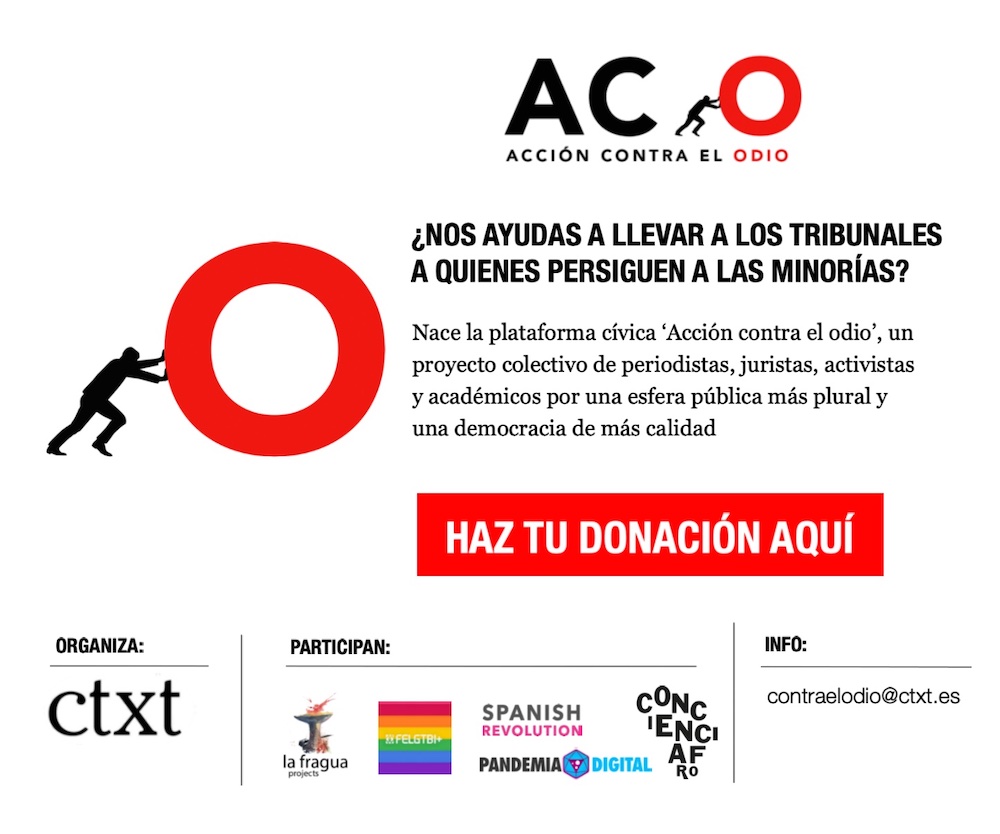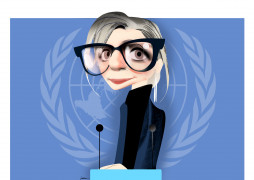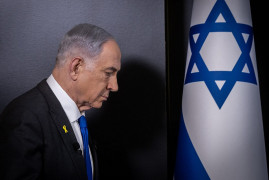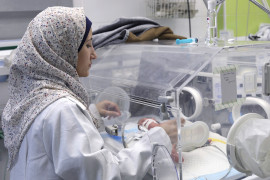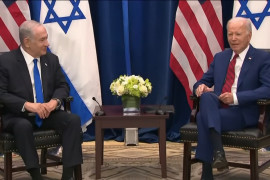Ceasefire
“I need to mourn for the 72 members of my family that I have lost”
After 466 days of devastation, the challenge for gazans is to reclaim a sense of normalcy amidst the rubble of shattered lives
Mahmoud Mushtaha 16/01/2025
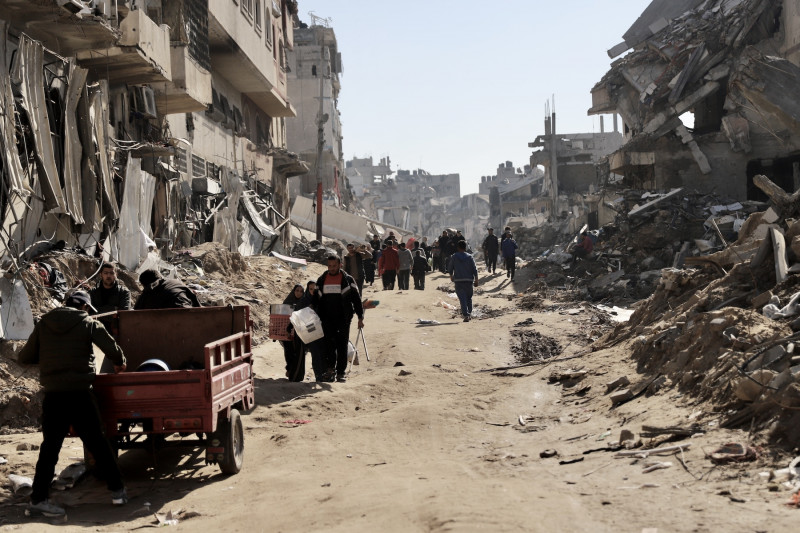
Palestinians walk between the shreds in Shuja'iya, north of Gaza. February 2024. / Mohammed Hajjar
En CTXT podemos mantener nuestra radical independencia gracias a que las suscripciones suponen el 70% de los ingresos. No aceptamos “noticias” patrocinadas y apenas tenemos publicidad. Si puedes apoyarnos desde 3 euros mensuales, suscribete aquí
I can't believe it—after 466 days of unimaginable suffering, relentless killing, and the calculated starvation and devastation unleashed by the Israeli war machine, the genocide in Gaza has finally come to an end.
The weight of those days still presses heavily on my heart. Every second was marked by grief, fear, and helplessness as countless lives were lost and families torn apart. Entire generations have been scarred by the relentless violence and the deafening silence of the international community. Yet, despite the atrocities committed, Israeli Zionist anf far-right propaganda has tried to twist the narrative, attempting to erase the humanity of the victims and justify the inhumane.
This moment feels surreal. The skies that once echoed with the roar of bombs now hold the possibility of healing. The streets that bore witness to endless pain might one day be filled with laughter again. But even as this chapter closes, the scars remain—a stark reminder of the world's failure to act sooner, of the urgent need for justice and accountability. The end of the genocide does not erase the crimes committed; instead, it amplifies the call for justice and for the prosecution of war criminals.
May this end not be just a pause but a true beginning: a path to healing, rebuilding, and ensuring that such atrocities never occur again. We don't need to return to the same circle of suffering and pain. Since 1948, we have endured relentless killing, all stemming from the lack of accountability for Israel.
What we need now is accountability for Israel and its war criminals
Now that a ceasefire has been agreed upon in Gaza, the bombs will stop falling, and the world will breathe a sigh of relief. Yet, for those of us who survived, the war hasn’t ended—it has merely transformed. The physical destruction may cease, but the psychological and emotional battles will continue. The trauma of loss, the memories of devastation, and the pain of survival will linger long after the last bomb has fallen. For Gaza, the challenge is no longer just to rebuild infrastructure but to reclaim a sense of normalcy amidst the rubble of shattered lives.
As these dark days come to an end, the scars remain—a stark reminder of the world's failure to act sooner. What we need now is accountability for Israel and its war criminals. justice for our victims. Without these, the ceasefire will only be a temporary pause, a mere interruption in a cycle of violence that has plagued Palestine for decades. We cannot afford to let this happen. We must demand that those responsible for the genocide be held to account, that the international community finally recognizes the humanity of the Palestinian people and their right to live in peace.
Unfortunately, we face another war after this one—a war with ourselves. It is a psychological battle, a fight to heal from the wounds that are not visible but are just as deep. How can we begin to heal when there are no homes to return to, no schools for our children, no hospitals to tend to the sick, and no universities to educate our youth? How can we rebuild our lives when the foundations of our society have been obliterated? What we need now is time to mourn, to grieve our loved ones, to cry, and to search for those who have been missing since October 7.
To understand the depth of the challenges ahead, I spoke with survivors, aid workers, and psychologists who have been on the ground in Gaza. Um Salim Amin, a mother of five, shared her fears: “We are relieved that the bombing has stopped, but what now? We have no home, no source of income, and no children for me. All 4 kids were killed by Israel on May 16, 2024. Peace is meaningless if we can’t find a way to live.” Her dream now after the ceasefire is to make a grave for her kids.
Dr. Adek, a psychologist working with trauma survivors, explained the long-term mental health crisis facing Gaza. “We are looking at an entire generation deeply scarred by genocdie, killing, and starvation,” he said. “Children who’ve witnessed unimaginable horrors, parents grappling with survivor’s guilt, and a population struggling to find hope amidst despair. The mental health infrastructure in Gaza was limited even before the conflict, and now it’s practically nonexistent.”
What Gaza needs now, according to experts, is multifaceted. Immediate humanitarian aid is critical—food, clean water, medical supplies, and temporary shelters must be prioritized. Beyond that, long-term investments in rebuilding infrastructure, restoring educational institutions, and providing mental health support are essential. The international community must step up not just with words but with action, ensuring that Gaza has the resources it needs to rebuild sustainably.
Now, the challenge in Gaza is to survive the upcoming days as the ceasefire takes place on January 19
This is not an end to war or a true ceasefire; it is merely a temporary halt to the Israeli killing machine. The end of active bombardment does not mean an end to the occupation, to the oppression, to the denial of our basic human rights. It is not peace—it is only a brief respite. And in this moment, I need to mourn. I need to grieve for my uncle Hisham and his wife Hanan, for their sons Mohammed and Bassil, and their seven children. I need to mourn for the 72 members of my family that I have lost. I need to mourn for my people, for the more than 50,000 lives that have been brutally taken. Each life lost is a world unto itself, and each deserves to be remembered, honored, and mourned.
Now, the challenge in Gaza is to survive the upcoming days as the ceasefire takes place on January 19. The road ahead is treacherous and uncertain. How will we survive without homes, without resources, without the basic necessities of life? The international community must not only call for accountability but also provide tangible support for Gaza’s reconstruction and rehabilitation. This is a humanitarian crisis that demands immediate and sustained action.
The resilience of the Palestinian people has been tested time and again. We have endured the unendurable, survived the unimaginable. And yet, we are still here. Our spirits remain unbroken, even as our hearts carry the weight of immense grief. This resilience must not be mistaken for acceptance. We will not accept a future where justice is denied, where war criminals walk free, where the lives of our loved ones are reduced to statistics. We demand justice. We demand dignity. We demand freedom.
The rebuilding of Gaza is not just about constructing homes and repairing infrastructure; it is about restoring hope, dignity, and humanity. It is about giving our children a future that is not defined by war and loss. It is about ensuring that the memories of those we have lost are preserved, that their stories are told, and that their sacrifices are not in vain.
Abood Fathi, 21, a young university student, expressed his fears: “I dreamed of becoming an engineer to rebuild Gaza, but now I don’t even know if there will be a university left. Will I ever have the chance to study again?” His words highlight a generation’s aspirations that hang in the balance.
As the world watches Gaza begin to emerge from the rubble, let it also watch with a sense of responsibility. Let it remember the role it played, whether through action or inaction, in allowing this tragedy to unfold. Let it commit to doing better, to standing with the oppressed, to holding the oppressors accountable. This is not just a Palestinian issue; it is a global issue. The fight for justice in Gaza is a fight for justice everywhere.
In the days to come, as the dust settles and the world’s attention inevitably shifts elsewhere, we must remain vigilant. We must ensure that the ceasefire is not a mere prelude to another chapter of violence. We must demand an end to the occupation, an end to the blockade, and an end to the systematic oppression of the Palestinian people. Only then can we begin to hope for true peace.
This is not the end of our struggle. It is not the end of our story. It is only a chapter—a painful, devastating chapter that we will carry with us always. But we will continue to write our story, to fight for our rights, to honor our martyrs, and to build a future worthy of their sacrifices. Palestine will rise again, not from the ashes of war, but from the strength and resilience of its people. And the world must never forget.
I can't believe it—after 466 days of unimaginable suffering, relentless killing, and the calculated starvation and devastation unleashed by the Israeli war machine, the genocide in Gaza has finally come to an end.
The weight of those days still presses heavily on my heart. Every second was marked by...
Autor >
Suscríbete a CTXT
Orgullosas
de llegar tarde
a las últimas noticias
Gracias a tu suscripción podemos ejercer un periodismo público y en libertad.
¿Quieres suscribirte a CTXT por solo 6 euros al mes? Pulsa aquí



